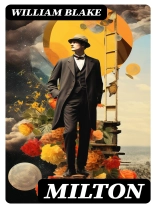William Blake’s ‘Milton’ is a profound exploration of the interplay between myth, imagination, and spiritual awakening. Written in a distinctively visionary style, this long poem articulates Blake’s unique cosmology, wherein the figure of John Milton serves as both a historical figure and a mythic archetype. Through his intricate use of symbols and allegory, Blake delves into themes of divine inspiration, the nature of the human soul, and the pursuit of artistic truth, positioning Milton as a prophet and his works as vehicles of profound knowledge and enlightenment. The poem, comprising a rich tapestry of allegorical prose and lyrical verses, reflects Blake’s belief in the power of creativity to transcend earthly limitations and connect with the divine. William Blake (1757-1827), a visionary poet and artist, was deeply influenced by both the Enlightenment and the Romantic movement. His radical ideas on art, sexuality, and religion were often considered ahead of his time, which shaped his literary voice. Blake’s admiration for Milton, along with his aspiration to express his own mythos, catalyzed the writing of ‘Milton.’ This work encapsulates Blake’s conviction that art should convey deep spiritual truths, often intertwining his personal insights with broader philosophical questions. ‘Milton’ is an essential read for those interested in understanding the intersection of poetry, spirituality, and the creative impulse. Through Blake’s visionary lens, readers will uncover a profound meditation on the nature of artistic creation and the spiritual journey. This book is not merely a poetic endeavor; it is an invitation to explore the infinite possibilities of the human imagination.
เกี่ยวกับผู้แต่ง
William Blake (1757–1827) was a seminal figure in the history of the poetry and visual arts of the Romantic Age. Renowned for his expressiveness and creativity, Blake was an artist, poet, and visionary of extraordinary depth and originality. His illuminated works, where text and engravings intertwined, were his distinctive mode of expression, not fully appreciated during his lifetime but celebrated posthumously. ‘MILTON: A Poem in Two Books’ is a prime example of this, showcasing Blake’s innovative use of typography and illustration alongside a narrative exploring themes of self-identity and spiritual journey, as part of his profound engagement with the human condition.
Blake’s literary style combined the simplicity and directness of folk ballads with a deep mysticism and prophetic tone, reflecting his personal spiritual beliefs and vision. His poetic works often carried social and existential ponderings, coupled with a ceaseless questioning of convention and authority. Like ‘Songs of Innocence and of Experience’, his writings frequently juxtaposed the states of innocence and experience, acting as mediums for social critique and personal introspection. Meanwhile, in ‘MILTON’, Blake delves into a complex interplay of characters and symbolism, reimagining the mythic poet John Milton’s return to Earth to reconcile the universal dichotomies of conflict. Through his body of work, Blake laid the groundwork for later generations of artists and writers and continued to shape the fields of poetry, art, and philosophy, securing his place as a pivotal figure in cultural history.












